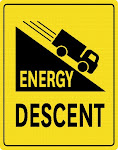Food Sovereignty Alliance chair Tammi Jonas recently took umbrage at
Artist as Family's application of the term
neo-peasant. She wondered whether we were "colonising the discourse". Tammi has just hosted Joel Salatin, other food celebrities and a host of punters, at her farm in Central Victoria. The event raised nearly $40,000 for the purposes of setting up a
legal defence fund. I wrote to Tammi in the spirit of debate.
Hi Tammi, if you're interested, here's a little more unpacking as to why we use the term neo-peasant:
In an economic sense it's peasant non-relianace on money that we identify with, and see money as the great curse [to ecological] cultures of place due to money's need to grow markets and exploit people and environments. This, essentially, [ends up as] neo-liberalism, growing anti-ecological city-centric cultures permissive of their pollution outputs. Hence our concentration on degrowth money economies and the growth of localised (non-transported) non-monetary economies (urban, rural, suburban).
 |
Neo-peasant Woody (4 yo) walks-for and wheelbarrows a small portion
of the household's fuel in readiness for the winter. |
We feel that Joel Salatin, for instance, is super cool when it comes to biology, but super problematic when it comes to his choice of economics. His form of economics we consider Christian-capitalist or conversion-capitalism. It is by nature imperialist as it must aggregate. In this way the great work he does in the biological field is undone by his economic form. To feed hypertechnocivilians (city dwellers) is not a reason for such activity, it only aggregates the problem of people not being accountable for their resources and not in relationship with the processes and communities of life that make life possible. We will never become an ecological culture of place while this pattern continues.
 |
| An ecology of money's waste in Central Queensland (passed by bicycle). |
These books also give contexts for our term neo-peasant:
It seems strange to us that regrarian is OK but neo-peasant is not. Perhaps you could unpack this? Do you think traditional agrarians would be offended by this term you use? I understand we have a (middle-class) choice to reconnect with our respective family peasant histories, and hence that's what the neo is doing. It immediately locates our privilege of education. We're immediately 'fessing up to this by using the prefix while honouring our ecologically intelligent ancestors and calling for a return.
Yours in community of change-makers.
Patrick
So far I haven't heard back from Tammi. But the questions raised concern us all. Why participate in the monetary economy? Why serve a system of economy that is inherently flawed and ecologically destructive? Why raise money to pay lawyers and thus pay heed to laws that only apply if raising money is at the heart of your economy?
 |
| Meg prepares gifted, grown and gleaned food in Artist as Family's kitchen. |










1 comments:
This is really interesting. I have been following your use of the term Neo-Peasant on Social Media find that the term really resonates with me. Therefore my interest is piqued to hear that someone is criticising its use. Particularly someone who is notionally 'on the same side'.
I would really like to read the initial part of this story, where Tammi originally took umbridge. Is it available online?
Post a Comment